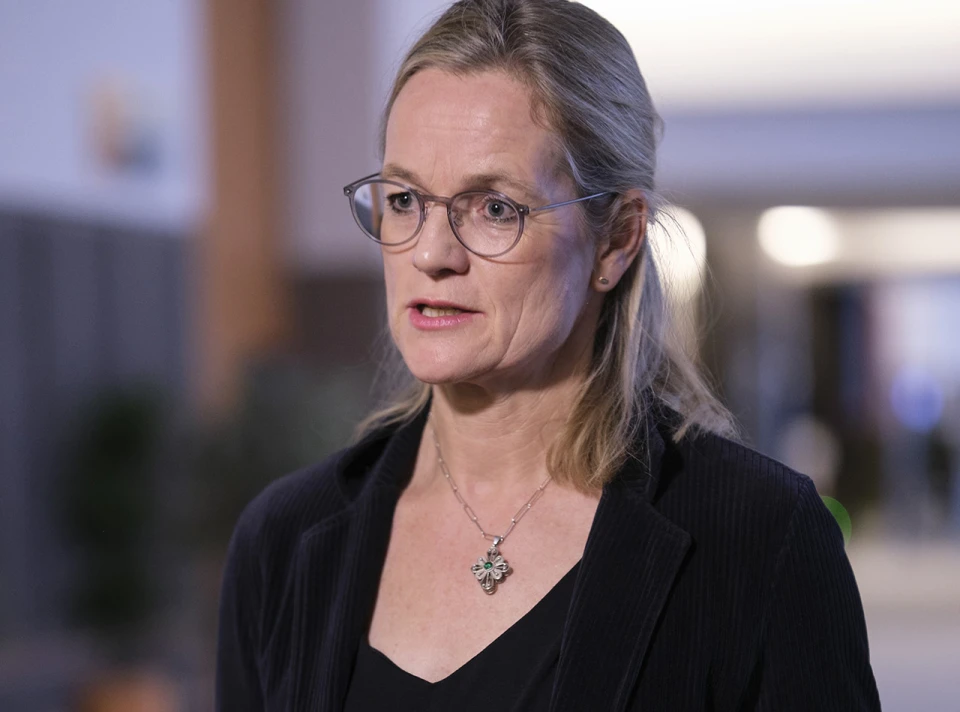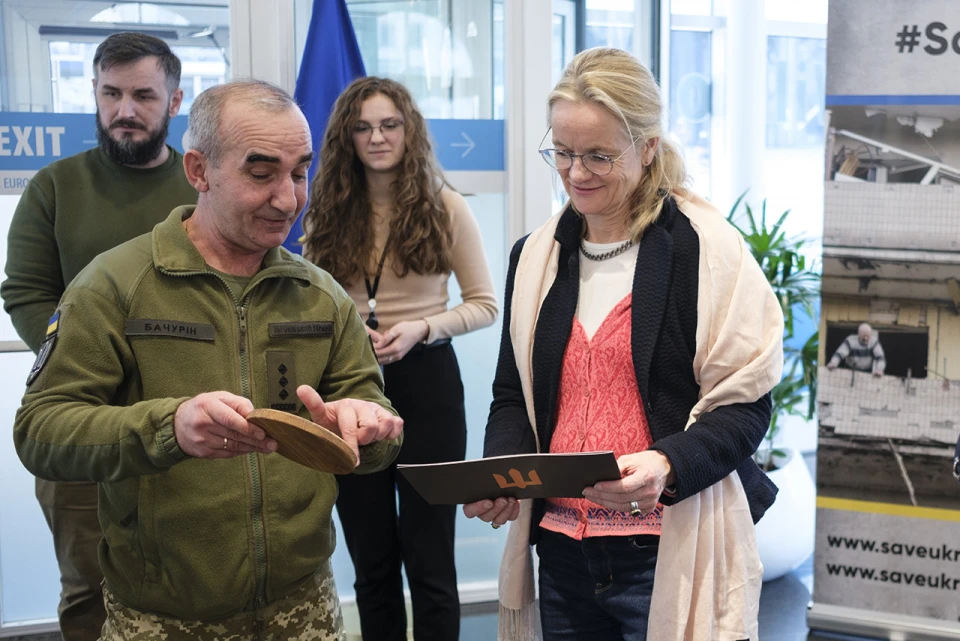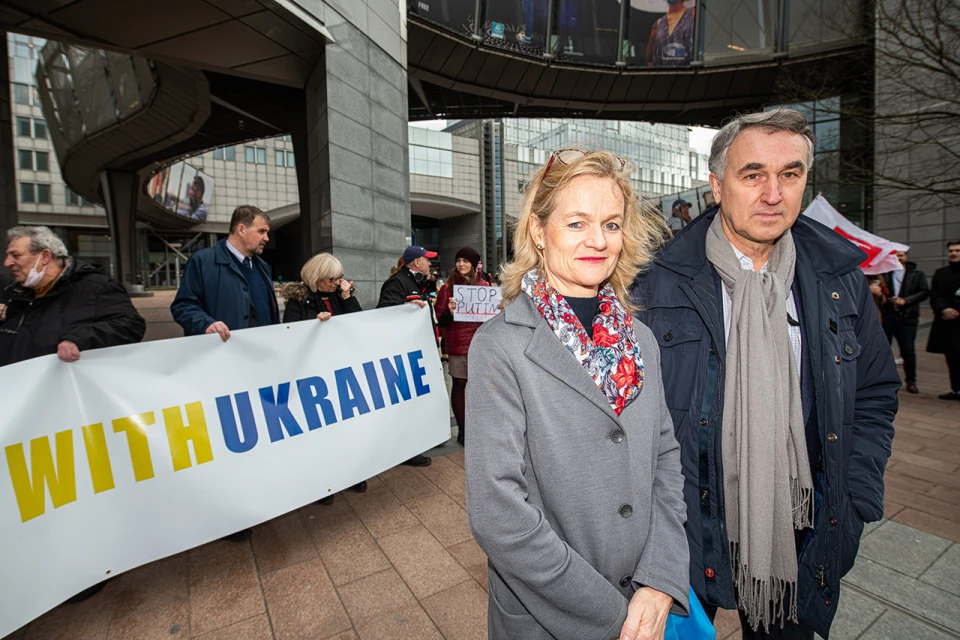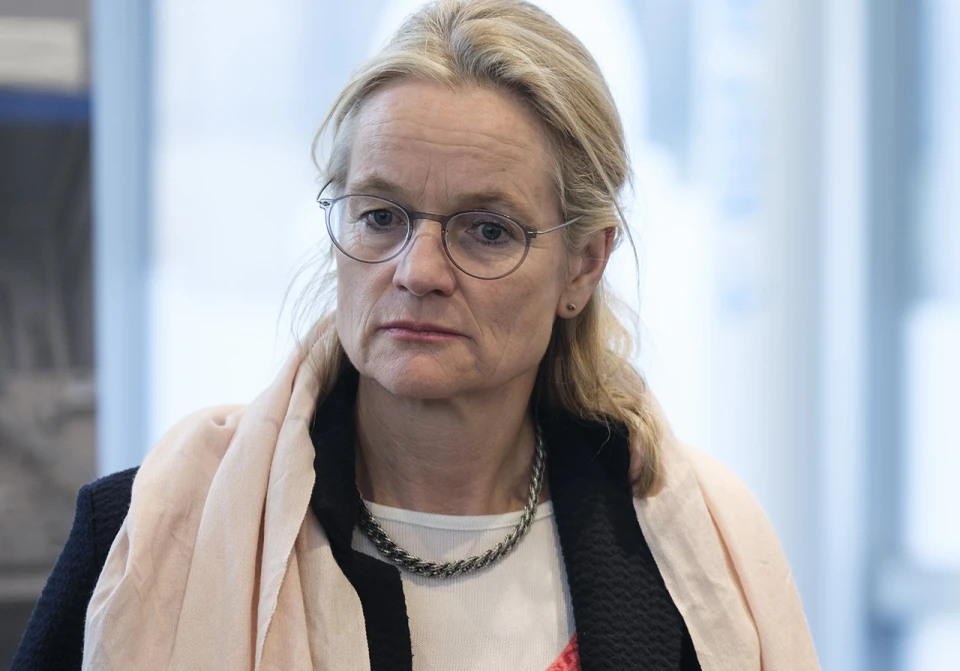
People in EU need to understand: Ukraine is not threat, but asset – former MEP Viola von Cramon in interview with Espreso
Viola von Cramon-Taubadel, a German politician and a former member of the European Parliament, spoke with Espreso about Ukraine's European integration
As Deputy Head of the European Parliament's delegation to the EU-Ukraine Parliamentary Association Committee, she assessed the progress of this integration, identified the key narratives in our communication with citizens, and advised which countries Ukraine should follow on its path to joining the European community.
Find out more about this in the interview.
Ms. von Cramon, could you describe how you see the progress of Ukraine's European integration today?
I think that Ukraine has actually taken the right path. You decided to pursue European integration. This is what the majority of the people hoped for, what the population is asking the government for, and, of course, it entails many different topics, new compositions, and various issues. In some sectors, Ukraine has already made significant progress, while in others, you still face significant challenges. So, it depends, but overall, the picture is clear.
We hope that in the not-too-distant future, we will see some form of ceasefire, sustainable peace, and the opportunity for a real reconstruction phase. Then, the European integration process should go hand in hand with the physical reconstruction process.

Photo: Getty Images
In your opinion, what are the biggest misconceptions about Ukraine's EU integration, both within Ukraine and internationally?
For Ukraine’s audience, it might be somewhat disillusioning how many details need to be considered. While Ukraine may consider areas like consumer protection and labor rights up to standard, it’s important to understand that there is still a long way to go to meet true European standards.
I don't see that the European Union or the European Commission will offer a shortcut for Ukraine. This means you need a lot of labor and capacity in the ministries and agencies.
What you should take into consideration is the fact that it requires a lot of staff, labor, and many experts and specialists in areas such as the judiciary sector, technical sectors, and so on. I think Ukraine and its population need to be patient. There's the big question of how Ukraine performs in anti-corruption efforts, the rights of the opposition in the Rada, how it treats journalists, and so on. These are what we call the fundamentals. The European Commission will look at these issues very carefully and thoughtfully.
In some sectors, Ukraine has made significant progress, and that is already visible.
I think the European Union's main concerns, especially in border countries like Poland, Romania, and Slovakia, are the strong competitiveness of the agricultural sector. We've seen a lot of protests against Ukrainian exports. I think this is extremely shameful, and it's very sad to see, especially considering that this is the only real source of revenue for Ukraine during the war. Ukrainians and traders haven't done anything wrong; they're just trying to sell their goods to the global market.
So, I think here we have to do a lot of work with farmers and citizens to show that Ukraine is not a threat, but an asset. So far, the European market imports quite a lot of grain for animal husbandry and other reasons. If Ukraine becomes a member of the European Union, this would be a win-win situation for both sides.
As for the second point, I don't know if people are truly afraid of Ukraine becoming a member of the European Union. I would say there's not enough knowledge about the situation in Ukraine. I tell people that Ukraine has a lot of skilled labor. Of course, this could also be an asset for European companies, especially in science-related jobs.
So, I don't see this as a big problem, nor do I think it will be difficult for us to communicate this in the proper way. However, we see that right-wing parties are rising, and they are generally against enlargement, especially against Ukraine's enlargement. This requires extra effort to explain to people why it’s good, not just for Ukraine, but also for us, if Ukraine joins.
How has the war in Ukraine changed the EU's approach to accepting new members?

Colonel Serhii Bachurin speaks with German MEP Viola von Cramon-Taubadel in Brussels, March 7, 2024, photo: Getty Images
I think that the European Union is now trying to find ways to send the right signals to Ukraine. The message is: “Okay, hopefully we can manage to end the war as soon as possible, but nevertheless, here are the next steps you need to take.”
So far, I think this has gone rather well. If I'm not mistaken, the next progress report is expected in March or April, and from there, both the Ukrainian and Moldovan governments can reassess. How many steps have been made, what has been achieved, and what is still left to be done? And where do we need to improve?
Which European countries' experiences with EU integration could be useful for Ukraine?
You are in close contact with the Baltic states and other newer EU members, such as Romania and Bulgaria. You’ve probably heard that they became members of the Schengen zone just today. They had been waiting for this moment for almost 17 years. They became EU members in 2007, but only today did they join the Schengen zone. This shows that there can be different speeds within the European Union, and perhaps this is a good example for Ukraine. You become a member, but you don’t have full rights from the beginning; you must work through various integration steps - such as joining the full Schengen zone, the Eurozone, and so on. Romania and Bulgaria are good examples of this.
Even though I thought Austria should not have blocked their Schengen accession, because that really harmed trust in both the country and EU institutions. Nevertheless, when you ask me which countries' experiences could be most helpful for Ukraine, I think Romania, Bulgaria, Croatia, and the Baltic states are good examples.

German MEP Viola von Cramon-Taubadel (L) and Lithuanian MEP Petras Auštrevičius (R) attend a protest by pro-Ukrainian supporters against Russia's plans to invade the country on Wednesday, Feb. 9, 2022, in Brussels, photo: Getty Images
For reference: The interview was recorded on December 12, the same day it was announced that EU member states had decided to remove border checks between Bulgaria and Romania starting January 1, 2025. This means that Romania and Bulgaria will finally join the Schengen Area. Austria had been blocking the decision since 2022 because of concerns over illegal migration.
The EU has clear requirements for candidate members. Which of these do they think are the most challenging for Ukraine to meet?
I think the independence of the judiciary is currently very difficult. The EU doesn't see Ukraine as having an independent judiciary. There may be individual judges or prosecutors, but in general, the prosecution is very opaque. You have far more prosecutors than Germany, even though the country is smaller. So, I think this area needs a lot of restructuring.
What positive changes do you see in Ukraine now, compared to the situation before the full-scale invasion?
I think it's really hard to judge because the situation during wartime is quite difficult. There’s more leniency for things that don’t go well. We’ve seen a lot of changes in leadership positions within the government, but I’m not sure what the criteria are for some of these appointments. It seems a bit opaque to many of us why certain people are chosen, and what the criteria are for these decisions. Whether this is related to the war or due to other reasons or motives, I can't say.
But in general, I would say that the main functions and duties of the state are still operating, which is very good. People are super disciplined; even in such a difficult time, they’re staying in Ukraine. They are patriotic and continue to interact with the government and public administration, so it’s not a failed state - not at all. On the contrary, it’s actually becoming stronger. People trust the army, trust the agencies, and trust state institutions, which is a very positive sign.
Regarding corruption, as I mentioned before, I would guess that in countries like Germany, if we were at war, there would be corruption as well. When you’re lacking resources and under pressure, and fighting for your survival, it’s extremely difficult to avoid. However, what I’ve seen in Ukraine is that investigations are ongoing, especially by the anti-corruption agency, and there is prosecution when cases arise. So overall, at least some cases are being handled as if they were in a peacetime civil context, which I think is quite extraordinary. You don’t see this in many other war situations.
Last year you attended the Women's Congress in Ukraine. What legislative initiatives would you recommend Ukrainian civil activists pursue to help move forward with EU integration?
The situation for women is not easy in many countries. For example, in Germany, what we are trying to pass in the Bundestag is a special protection law for women. Almost every day in Germany, a woman is killed by her former husband, partner, or some third party. These killings, mostly committed by men, are referred to as femicide. The law that we hope to vote on next week is aimed at addressing this issue - finding shelter for women, providing protection, and offering financial support for those in danger.
I believe having something similar in Ukraine is crucial. If women are threatened by a former partner, husband, or anyone else, having legal protections and support is extremely important. Of course, the war situation makes this even more challenging. It’s important to bring this issue to the agenda and ensure that women are treated well, and have access to justice, shelter, financial support, and so on.

Photo: Getty Images
How should we communicate the European integration process both domestically and internationally?
I think the better the checks and balances in a country, the better politicians will understand that with existing corruption schemes, it would be very difficult to convince our citizens here to support Ukraine financially. If our citizens don’t trust that the money or taxes we send to Ukraine are being spent properly, it could become a major scandal, and their support for Ukraine would diminish immediately.
So, it must be in the interest of politicians, large companies, and the CEOs of major civil society organizations to ensure that checks and balances are in place. Journalists, including investigative journalists, must be allowed to work freely - no taboos, no red lines.
And of course, there must be a functioning judiciary system with an anti-corruption agency, an anti-corruption bureau, and strong cooperation between the prosecution and investigative bodies. That is the best prevention you can have, and it’s also the best endorsement for your integration into the EU.
So, if you can convince your own politicians, the better you are at tackling corruption, the faster you can enter the European Union. This must be the narrative.
How will Ukraine benefit the EU?
Each country has made us stronger. In the current situation, individual states cannot achieve much on their own. But the larger and more integrated the organization is - in terms of economy, laws, and labor standards - the easier it is for the whole body to work together. It also makes it easier to defend our values.
Now, with the situation we’re facing, we’ll see how difficult the Trump administration’s approach will be for all of us. China, on the other hand, is also pushing and trying to cross red lines. The bigger we are in Europe, and the more cohesive we are, the easier it will be to stand up to global players like the U.S., China, and others.
This needs to be understood. And that’s why it’s in my interest, not just to bring Ukraine into the EU at any cost, but to bring Ukraine in after it has been reformed. This needs to be understood by politicians and governments.
Well, the war situation makes this extremely difficult, but in general, I would say that if there is political will, Ukraine is a huge asset for the EU. People like you, like many others - this is Europe, and there is no difference between us. So why not bring you in, if the political system is reformed?
The material was published as part of the “Democratic Integration, Resilience, and Engagement” (Ukraine-DARE) project, implemented by Democracy Reporting International (DRI) in cooperation with the Reanimation Package of Reforms coalition and the Center for Political and Legal Reforms with the financial support of the Federal Foreign Office of Germany. The project aims to facilitate the approximation of Ukrainian legislation to the EU norms, build a dialogue on the challenges to democracy in Ukraine during the war, and promote civic engagement of young people. The opinions and views expressed in this material do not necessarily reflect the position of the Federal Foreign Office of Germany.

- News












































